Unit 1 Preparing for the topic and Exploring the Topic 重难点解析及练习(无答案) 2024-2025学年仁爱科普版英语七年级上册
文档属性
| 名称 | Unit 1 Preparing for the topic and Exploring the Topic 重难点解析及练习(无答案) 2024-2025学年仁爱科普版英语七年级上册 | 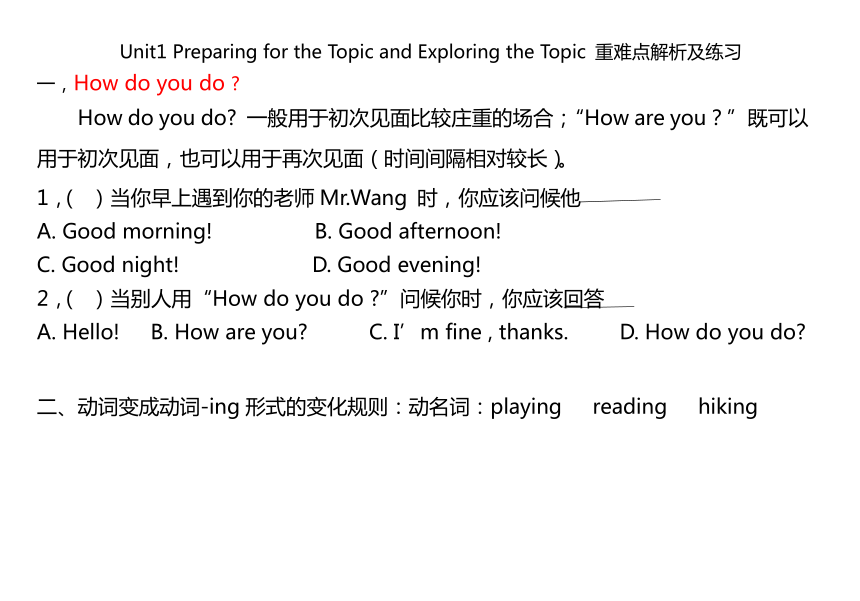 | |
| 格式 | docx | ||
| 文件大小 | 688.8KB | ||
| 资源类型 | 教案 | ||
| 版本资源 | 仁爱科普版 | ||
| 科目 | 英语 | ||
| 更新时间 | 2024-09-27 14:10:23 | ||
图片预览

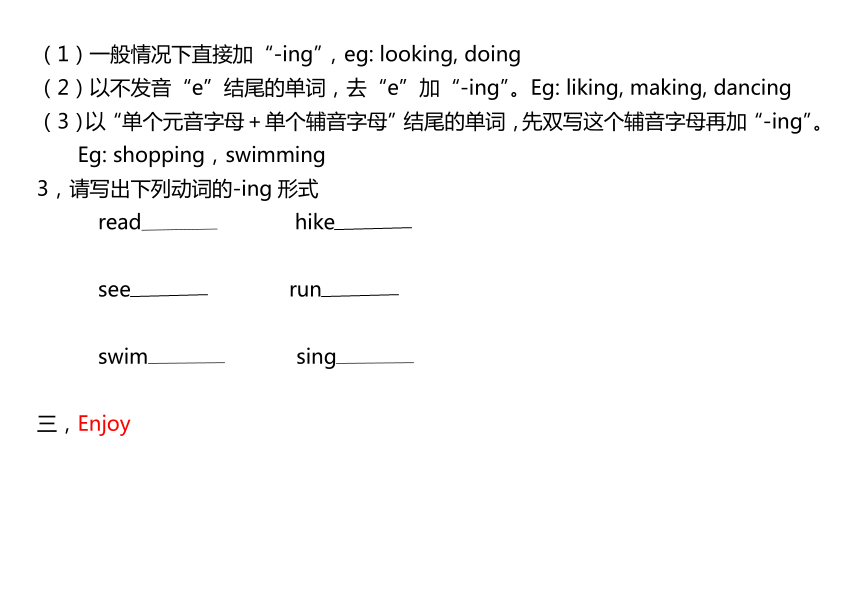
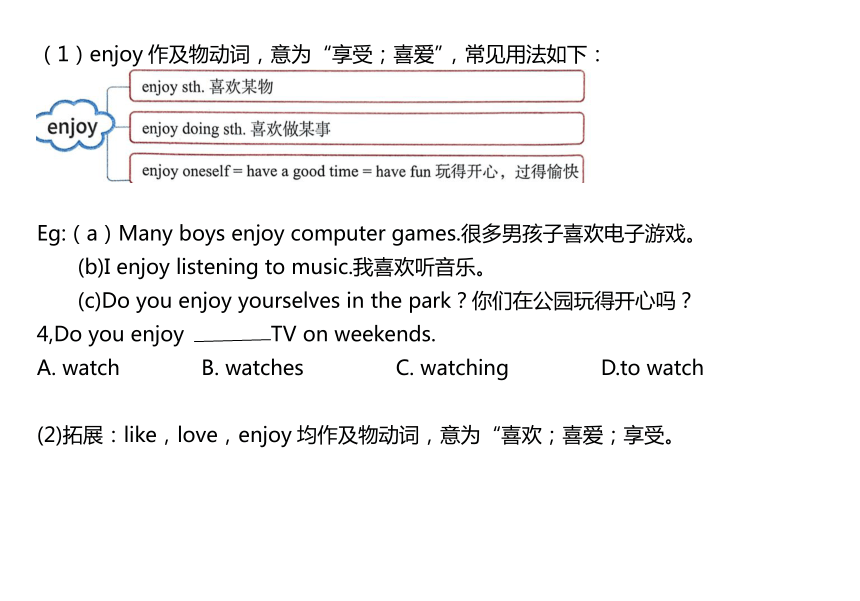
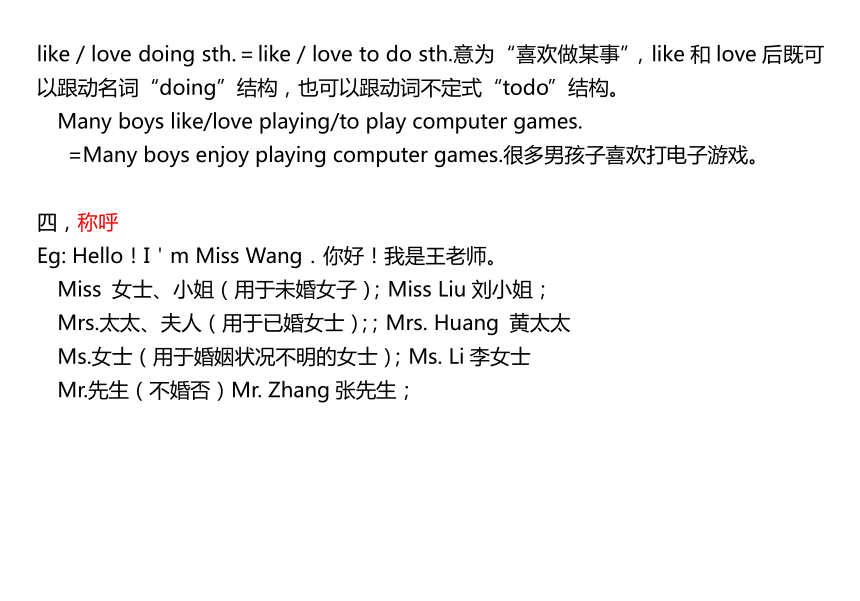
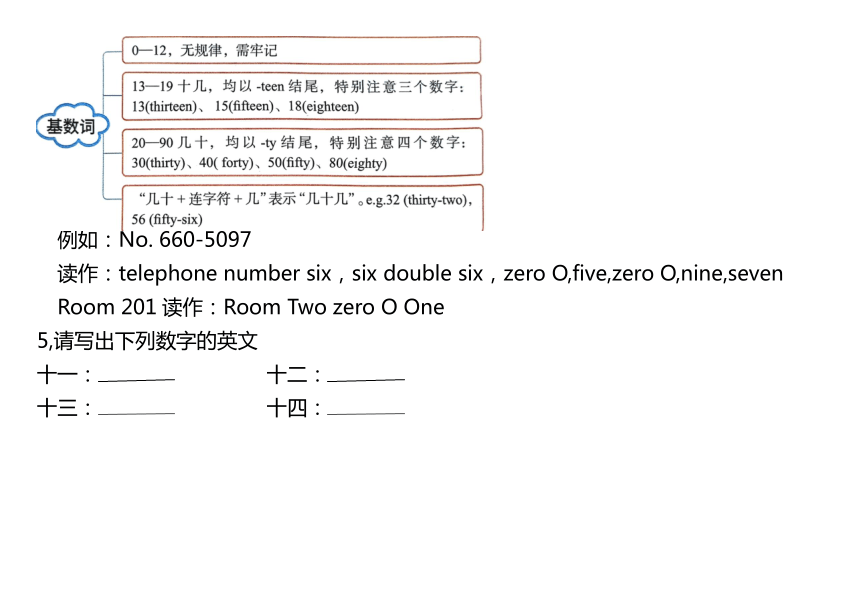
文档简介
Unit1 Preparing for the Topic and Exploring the Topic 重难点解析及练习
一,How do you do
How do you do 一般用于初次见面比较庄重的场合;“How are you?”既可以用于初次见面,也可以用于再次见面(时间间隔相对较长)。
1,( )当你早上遇到你的老师Mr.Wang 时,你应该问候他
A. Good morning! B. Good afternoon!
C. Good night! D. Good evening!
2,( )当别人用“How do you do ”问候你时,你应该回答
A. Hello! B. How are you C. I’m fine , thanks. D. How do you do
二、动词变成动词-ing形式的变化规则:动名词:playing reading hiking
(1)一般情况下直接加“-ing”,eg: looking, doing
(2)以不发音“e”结尾的单词,去“e”加“-ing”。Eg: liking, making, dancing
(3)以“单个元音字母+单个辅音字母”结尾的单词,先双写这个辅音字母再加“-ing”。
Eg: shopping,swimming
3,请写出下列动词的-ing形式
read hike
see run
swim sing
三,Enjoy
(1)enjoy作及物动词,意为“享受;喜爱”,常见用法如下:
Eg:(a)Many boys enjoy computer games.很多男孩子喜欢电子游戏。
(b)I enjoy listening to music.我喜欢听音乐。
(c)Do you enjoy yourselves in the park?你们在公园玩得开心吗?
4,Do you enjoy TV on weekends.
A. watch B. watches C. watching D.to watch
(2)拓展:like,love,enjoy均作及物动词,意为“喜欢;喜爱;享受。
like/love doing sth.=like/love to do sth.意为“喜欢做某事”,like和love后既可以跟动名词“doing”结构,也可以跟动词不定式“todo”结构。
Many boys like/love playing/to play computer games.
=Many boys enjoy playing computer games.很多男孩子喜欢打电子游戏。
四,称呼
Eg: Hello!I'm Miss Wang.你好!我是王老师。
Miss 女士、小姐(用于未婚女子);Miss Liu刘小姐;
Mrs.太太、夫人(用于已婚女士);;Mrs. Huang 黄太太
Ms.女士(用于婚姻状况不明的女士);Ms. Li李女士
Mr.先生(不婚否)Mr. Zhang张先生;
五,基数词书写规则
例如:No. 660-5097
读作:telephone number six,six double six,zero O,five,zero O,nine,seven
Room 201读作:Room Two zero O One
5,请写出下列数字的英文
十一: 十二:
十三: 十四:
十五: 十六:
十七: 十七:
十九: 二十:
六:Where are you from?你来自哪里?
(1)be from 意为“从····来,来自······”,相当于come from。from后跟表示国家、城市、省份等地点名词。be动词要随着前面主语人称和数的变化而变化。
I am from Beijing.(=I come from Beijing.) 我来自北京。
Are you from Canada (=Do you come from Canada ) 你来自加拿大吗?
(2) Where+be+主语+from "意为“······来自哪里?”where 用来对地点进行提问。此句型是由where引导的特殊疑问句,回答时用:“主语+be from+地点名词”。
Eg: Where is he from?他来自哪里? -He is from China.他来自中国。
-Where are Mike and Jim from?迈克和吉姆来自哪里?
-They are from the USA.他们来自美国。
6,Kangkang and Li Xiang China.
=Kangkang and Li Xiang .
七:Which class/grade
-Which class are you in?你在哪个班级?
-I'm in Class 6,Grade 7.我在七年级六班。
(1)在该句中,which class构成疑问词组。在这个词组中,class用作普通名词,首字母要小写。其回答是“主语+be+Class+数字,Grade+数字”。注意 class/grade 与具体的数字连用时作专有名词,首字母都要大写,且两个词组中间用逗号隔开。
(2)which grade 意为“哪个年级”,是疑问词组,用来对年级提问,引导特殊疑问句。 Which grade is Jenny in?珍妮在几年级?
-She is in Grade Eight.她在八年级。
7,( )We are from the same class. We are both in
A. class one, grade seven
B. Class one, Grade seven
C. class One, grade Seven
D. Class One, Grade Seven
拓展:class还有“(一节)课;上课”之意。 in class 在课堂上
have an English class 上英语课 have two classes 有两节课
八,friendly 形容词,友好的
(1)be friendly to sb 对某人很友好
= be kind to sb
(2) be friendly with sb 和某人关系很好
Eg: Kangkang is very friendly/kind to his classmates.
康康对他的同学非常友好。
He is friendly with all his classmates.他和他的所有同学关系都很好。
8,In my new school, my teachers and students(对…友好) me.
九,need
need实义动词,意为“需要”,有人称和数的变化,后可接名词或动词不定式(to+动词原形)。常见用法如下:
(1)need to do sth 需要做某事
(2)need sb / sth 需要某人/某物
(3)need sb to do sth 需要某人做某事
Eg: I need an English book now.现在我需要一本英语书。
We are students. We all need to get up early every morning.
我们是学生。每天早上我们都需要早起。
I need you to help me with my English. 我需要你帮我补习英语。
9,( )I need a new dress for my daughter.
A. buy B. buying C. buys D.to buy
十,other
(1)Friends play together and help each other.
此处“other”作代词,意为另外的人/物,常以复数形式others出现。
Eg: I don’t like this coat. Please show me some others.
我不喜欢这件外套。请给我看看别的。
(2)other作形容词,意为“另外的,别的,其他的,别的”,前面通常加限定词some, any, the, no等,用来修饰名词,常放名词前。
(3)each other意为“互相,彼此”,作代词,在及物动词后面可直接用宾语;在不及物动词之后,需要加上介词。
(a)help each other 互相帮助
(b)learn from each other 互相学习
(c)meet each other 见到彼此
10,( )There are two apples on the table. One is red and is green.
A. the other B. another C. others D. the others
11,We are good friends,and we often(互相帮助,互相学习)
十一,play
(1), play basketball / soccer / football / ping-pong / tennis
(2), play the piano / guitar / violin / pipa
(3), play chess / card 下棋/打扑克
十二,happy 愉快的,高兴的,幸福的
Be happy to do sth. 很高兴做某事
=be glad/pleased to do sth
12,迈克尔很高兴有一个幸福的家庭
Michael is to have a family.
一,How do you do
How do you do 一般用于初次见面比较庄重的场合;“How are you?”既可以用于初次见面,也可以用于再次见面(时间间隔相对较长)。
1,( )当你早上遇到你的老师Mr.Wang 时,你应该问候他
A. Good morning! B. Good afternoon!
C. Good night! D. Good evening!
2,( )当别人用“How do you do ”问候你时,你应该回答
A. Hello! B. How are you C. I’m fine , thanks. D. How do you do
二、动词变成动词-ing形式的变化规则:动名词:playing reading hiking
(1)一般情况下直接加“-ing”,eg: looking, doing
(2)以不发音“e”结尾的单词,去“e”加“-ing”。Eg: liking, making, dancing
(3)以“单个元音字母+单个辅音字母”结尾的单词,先双写这个辅音字母再加“-ing”。
Eg: shopping,swimming
3,请写出下列动词的-ing形式
read hike
see run
swim sing
三,Enjoy
(1)enjoy作及物动词,意为“享受;喜爱”,常见用法如下:
Eg:(a)Many boys enjoy computer games.很多男孩子喜欢电子游戏。
(b)I enjoy listening to music.我喜欢听音乐。
(c)Do you enjoy yourselves in the park?你们在公园玩得开心吗?
4,Do you enjoy TV on weekends.
A. watch B. watches C. watching D.to watch
(2)拓展:like,love,enjoy均作及物动词,意为“喜欢;喜爱;享受。
like/love doing sth.=like/love to do sth.意为“喜欢做某事”,like和love后既可以跟动名词“doing”结构,也可以跟动词不定式“todo”结构。
Many boys like/love playing/to play computer games.
=Many boys enjoy playing computer games.很多男孩子喜欢打电子游戏。
四,称呼
Eg: Hello!I'm Miss Wang.你好!我是王老师。
Miss 女士、小姐(用于未婚女子);Miss Liu刘小姐;
Mrs.太太、夫人(用于已婚女士);;Mrs. Huang 黄太太
Ms.女士(用于婚姻状况不明的女士);Ms. Li李女士
Mr.先生(不婚否)Mr. Zhang张先生;
五,基数词书写规则
例如:No. 660-5097
读作:telephone number six,six double six,zero O,five,zero O,nine,seven
Room 201读作:Room Two zero O One
5,请写出下列数字的英文
十一: 十二:
十三: 十四:
十五: 十六:
十七: 十七:
十九: 二十:
六:Where are you from?你来自哪里?
(1)be from 意为“从····来,来自······”,相当于come from。from后跟表示国家、城市、省份等地点名词。be动词要随着前面主语人称和数的变化而变化。
I am from Beijing.(=I come from Beijing.) 我来自北京。
Are you from Canada (=Do you come from Canada ) 你来自加拿大吗?
(2) Where+be+主语+from "意为“······来自哪里?”where 用来对地点进行提问。此句型是由where引导的特殊疑问句,回答时用:“主语+be from+地点名词”。
Eg: Where is he from?他来自哪里? -He is from China.他来自中国。
-Where are Mike and Jim from?迈克和吉姆来自哪里?
-They are from the USA.他们来自美国。
6,Kangkang and Li Xiang China.
=Kangkang and Li Xiang .
七:Which class/grade
-Which class are you in?你在哪个班级?
-I'm in Class 6,Grade 7.我在七年级六班。
(1)在该句中,which class构成疑问词组。在这个词组中,class用作普通名词,首字母要小写。其回答是“主语+be+Class+数字,Grade+数字”。注意 class/grade 与具体的数字连用时作专有名词,首字母都要大写,且两个词组中间用逗号隔开。
(2)which grade 意为“哪个年级”,是疑问词组,用来对年级提问,引导特殊疑问句。 Which grade is Jenny in?珍妮在几年级?
-She is in Grade Eight.她在八年级。
7,( )We are from the same class. We are both in
A. class one, grade seven
B. Class one, Grade seven
C. class One, grade Seven
D. Class One, Grade Seven
拓展:class还有“(一节)课;上课”之意。 in class 在课堂上
have an English class 上英语课 have two classes 有两节课
八,friendly 形容词,友好的
(1)be friendly to sb 对某人很友好
= be kind to sb
(2) be friendly with sb 和某人关系很好
Eg: Kangkang is very friendly/kind to his classmates.
康康对他的同学非常友好。
He is friendly with all his classmates.他和他的所有同学关系都很好。
8,In my new school, my teachers and students(对…友好) me.
九,need
need实义动词,意为“需要”,有人称和数的变化,后可接名词或动词不定式(to+动词原形)。常见用法如下:
(1)need to do sth 需要做某事
(2)need sb / sth 需要某人/某物
(3)need sb to do sth 需要某人做某事
Eg: I need an English book now.现在我需要一本英语书。
We are students. We all need to get up early every morning.
我们是学生。每天早上我们都需要早起。
I need you to help me with my English. 我需要你帮我补习英语。
9,( )I need a new dress for my daughter.
A. buy B. buying C. buys D.to buy
十,other
(1)Friends play together and help each other.
此处“other”作代词,意为另外的人/物,常以复数形式others出现。
Eg: I don’t like this coat. Please show me some others.
我不喜欢这件外套。请给我看看别的。
(2)other作形容词,意为“另外的,别的,其他的,别的”,前面通常加限定词some, any, the, no等,用来修饰名词,常放名词前。
(3)each other意为“互相,彼此”,作代词,在及物动词后面可直接用宾语;在不及物动词之后,需要加上介词。
(a)help each other 互相帮助
(b)learn from each other 互相学习
(c)meet each other 见到彼此
10,( )There are two apples on the table. One is red and is green.
A. the other B. another C. others D. the others
11,We are good friends,and we often(互相帮助,互相学习)
十一,play
(1), play basketball / soccer / football / ping-pong / tennis
(2), play the piano / guitar / violin / pipa
(3), play chess / card 下棋/打扑克
十二,happy 愉快的,高兴的,幸福的
Be happy to do sth. 很高兴做某事
=be glad/pleased to do sth
12,迈克尔很高兴有一个幸福的家庭
Michael is to have a family.
同课章节目录
